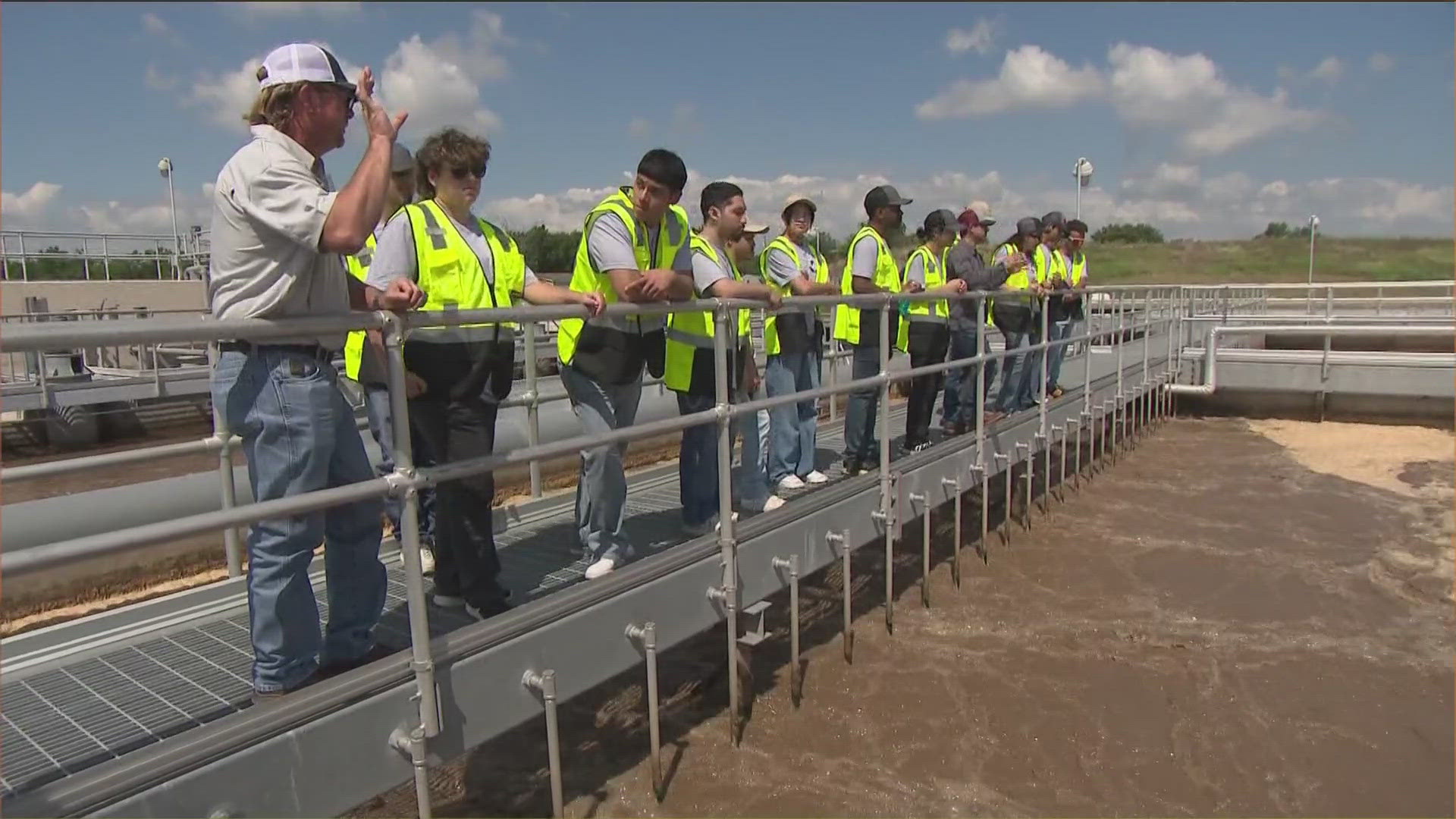PFLUGERVILLE, Texas —
As the population in Texas grows, so does the water demand.
The KVUE Defenders have been tracking water scarcity issues across Central Texas. In 2022, our reporting revealed that the State Water Plan predicted municipal water demands would exceed existing water supplies by 2030.
But that's not the only crisis facing the water industry.
A labor crisis looms as scores of water operators are expected to retire in three to five years.
But Pflugerville ISD hopes to change that as it becomes the first district in the state to launch a new water operator training program.
The four-week summer class included a field trip to the Manor Wastewater Treatment Plant – an exciting experience for students like Ethan Brock.
"It was sick," Brock said.
Brock and his classmates got a firsthand look at how the wastewater treatment plant works.
"It was really, really cool and just eye-opening to see what it takes to take our wastewater and then redistribute it through the cycle," Arielle Rangel said.
"I haven't seen anything like that," Jonathan Chinea said. "It was a lot of new things for me."
Seeing the "how" and "why" helped the students connect the dots.
"Because in the class, you're not seeing it. So you're trying to think about in your head how it works. And now, you're actually seeing it right in front of you. And it's like, 'OK, that's how it works,'" Cason Jacobs said.
The tour, field demonstrations and classroom instructions are new for Texas high school juniors and seniors, thanks to House Bill 1845, which went into effect in September of last year. It created the provisional certification program for students still in school.
Pflugerville ISD is the first district in Texas to launch the new online training program.
"It's kind of standard for us," said Traci Hendrix, Pflugerville ISD's Career and Technical Education director.
Before 2024, only graduating seniors were allowed to earn a water operator license in Pflugerville ISD's own water operator program.
"We're basically taking all of the experiences that a student might have in a traditional course over a year, and we're condensing it into a four-week academy model," Hendrix said.
Back in the classroom, Dean Sharp with the Texas American Water Works Association walked students through the first-ever high school training program because he helped develop it.
The association's State of the Water Industry 2024 report shows workforce issues are one of the top challenges.
The KVUE Defenders wanted to know how many water operators are licensed in Texas. According to the Texas Commission on Environmental Quality (TCEQ), the lowest total number of water operator licenses in the last 10 years was reported in 2018, when there were 14,979.
Since then, the number has steadily increased. As of the end of May 2024, there are 17,347 active licensed water operators.
The numbers reflect operators in the areas of groundwater, surface water and water distribution. Class A and D water operators are also included. Here's a look at the numbers by year:
- 2014 – 15,338
- 2015 – 15,431
- 2016 – 15,735
- 2017 – 15,445
- 2018 – 14,979
- 2019 – 15,649
- 2020 – 15,702
- 2021 – 16,422
- 2022 – 16,731
- 2023 – 17,124
- 2024* – 17,347 (*as of May 31, 2024)
But Sharp said the steady increase since 2018 is misleading.
"We continue to see challenges across the state and in pretty much every water system," he said. "The operator shortage in the industry is well into the thousands."
As communities continue to grow, so do water systems. That means a need for more operators. And in the next three to five years, Sharp said the aging industry expects to see a lot of retirements.
"Especially in our smaller and rural systems ... Their workforce selection is much less," Sharp said.
In November, the KVUE Defenders visited Sharp and other members working on the pilot program, called the SETH Project for "Science, Engineering, Technology and Health."
Sharp said they'll develop a wastewater operator program next.
Offering high school students like Arielle Rangel the chance to start a career while she attends college, where she is majoring in engineering.
"Working at the plant at night to get you through college – and that's super important to me because I'd love to be as debt- free as possible," Rangel said.
As demand for water increases, the 17-year-old knows a job in the industry will make a difference.
"I mean, we could not survive without water and I would be directly playing a part in that," she said. "Definitely makes me feel more important."
So far, 27 students have graduated from the water operator program at Pflugerville ISD's Skilled Trades Academy. Other school districts have expressed interest and are expected to adopt the online pilot program soon.

